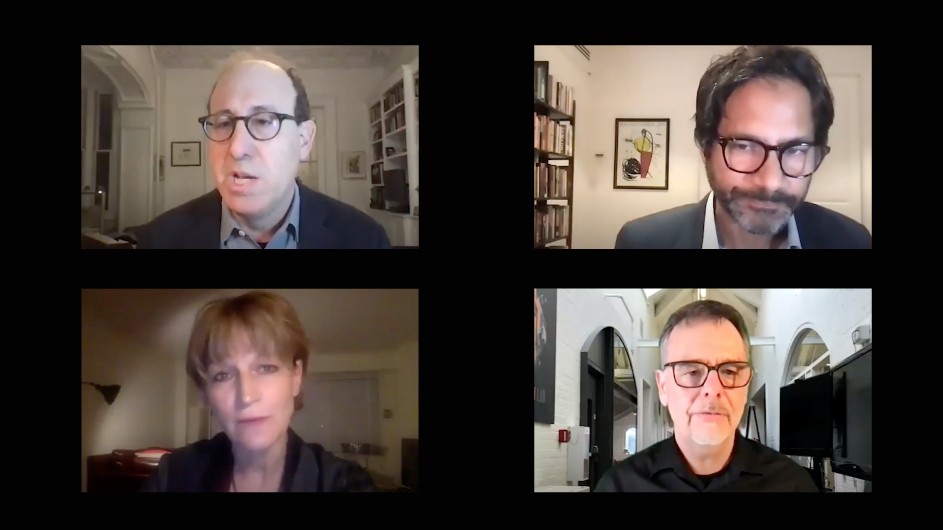Free Speech Advocates Call for Accountability Over Khashoggi Killing
Jameel Jaffer and Agnès Callamard renew demands that Saudi crown prince be held responsible for journalist’s death and cover-up.

Press freedom, human rights, and digital security experts at a February 24 panel discussion—co-sponsored by the Knight First Amendment Institute at Columbia University, Columbia Global Freedom of Expression, and the Committee to Protect Journalists—called for greater accountability over the ruthless 2018 killing of journalist Jamal Khashoggi by agents of the Saudi government.
The event took place just ahead of the release of a highly anticipated report from U.S. intelligence on Khashoggi’s death, which was withheld illegally under the Trump administration, said Knight Institute executive director and panel moderator Jameel Jaffer. The intelligence report, released two days later on February 26, concluded that Saudi Arabia’s crown prince was likely responsible for the journalist’s murder.
The hour-long virtual discussion, which drew approximately 150 viewers from around the world, followed a pre-screening of “The Dissident,” a recently released documentary detailing the murder, and exploring the human rights, press freedom, and digital surveillance issues raised by the case.
Much of the panel’s talk centered on ensuring that those responsible for the killing and its cover-up are held to account. Agnès S. Callamard, director of Global Freedom of Expression and the U.N. special rapporteur who led the inquiry into the assassination, said that it is already clear who was behind Khashoggi’s murder.
“What we are looking at now is not a rogue operation, as [the Saudi government] keeps insisting,” she said, “but a state execution conducted, resourced, and organized by the state of Saudi Arabia.”
Callamard submitted her findings to the U.N.’s Human Rights Council in 2019. She acknowledged during the panel that she had to conduct her inquiry without ready access to materials from intelligence sources and with only limited time and money from the U.N. Jaffer lauded the results, nonetheless, as “exhaustive and meticulously researched.”
Justice Versus Accountability
The panelists discussed the challenges of bringing the perpetrators of the crime to justice. Joel Simon, executive director of the Committee to Protect Journalists, recalled having spoken with Callamard at the start of her investigation. “I said, ‘Do you know what justice looks like?’ And you said, ‘It’s not going to be justice. It’s going to be accountability.’ ”
“Only a very naive person would have expected the Saudi judicial system to deliver accountability,” Callamard acknowledged. “In that context, I think what civil society has done, what I hope I have contributed, is a very important part of the journey for justice. Because justice is not an outcome, it's a journey. And if you look at [the Khashoggi case] as a journey, then we can say that we have progressed in the right direction. We have not let go. We have not let the issue fall off the agenda. We have kept hammering, for the sake of accountability and for the sake of American democracy.”
Callamard held out further hope that the U.S. intelligence report on the assassination would provide further evidence that would be “impossible for the rest of the world to ignore.”
“There are a lot of things that the Biden administration could do” in the wake of the intelligence report’s release, said Simon. “But none of them will matter if it does not demonstrate that justice matters and that it will put the life of this journalist and the principle that is at stake before any other consideration in the relationship with Saudi Arabia.”
Surveillance and Civic Action
The panelists’ alarm went beyond Khashoggi’s vicious murder to questions over how an expanding surveillance society might crush civic action. “A huge chilling effect is sweeping over civil society,” added panelist Ron Deibert, director of the Citizen Lab, University of Toronto. He contrasted the optimism with which pro-democracy activists used digital media during the Arab Spring with current concerns over the surveillance economy’s abuse of personal data.
“People were using social media, instant messaging applications, email applications, to organize and mobilize,” Deibert recalled. “Now it's like sand has been put in the machinery of all of this equipment and technology, because of the fear and the climate of concern around surveillance.”
Deibert cautioned that government responses to the abuses of surveillance technology were “not very promising.” He also held out limited hope that litigation could curb the worst effects. Callamard, for her part, called on corporations to draw a “red line” over doing business with any countries where their products, including information and surveillance technologies, may be used to repress freedom of expression.
“Basically that leaves civil society largely on our own,” added Deibert. “We have to build up our own capacity, our own awareness that this is going on, first of all, so that targeted groups can understand digital security is a very serious risk.”
In that spirit, Simon praised fellow panelists and others who he said were “pushing back against the stifling surveillance that puts us all at risk [in] what is perhaps the defining press freedom struggle of our time.”
In an analysis following the event and release of the intelligence report on Khashoggi’s murder, Jaffer and Simon called for a “reckoning… now the world must ensure that the Saudi regime, and the crown prince in particular, are held accountable,” they wrote, adding: “This is a watershed moment, and how the Biden administration responds to this monstrous crime will tell us a great deal about the depth of its commitment to press freedom and human rights. It’s also a test for Congress and for American business and civic leaders.”
Watch the full recording of the event here: